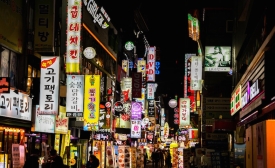russia
Russian Foreign Minister Sergey Lavrov, Russian Ambassador to the US Sergey Kislyak and Fairbanks Mayor Jim Matherly have laid wreaths at the monument dedicated to heroes of the Alaska-Siberia (ALSIB) Lend-Lease air route. During World War II, Fairbanks, Alaska, was part of the air route along which aircraft were transported from the United States to the Soviet Union under the Lend-Lease agreements.[...] From 1942 to 1945, Soviet and US pilots ferried about 8,000 warplanes, which had a meaningful effect on the course of the fighting on the Soviet-German front
In addition to formal public diplomacy mouthpieces like Russia Today and Sputnik, Russia employs armies of paid trolls and botnets to generate false information that can later be circulated and legitimated as if it were true. Then, in 2016, Russian military intelligence went a step further, by hacking into the private network of the Democratic National Committee, stealing information, and releasing it online to damage Hillary Clinton’s presidential candidacy.
Russia’s interference in the 2016 US presidential election, and its suspected hacking of French President Emmanuel Macron’s campaign servers, should surprise no one, given President Vladimir Putin’s (mis)understanding of soft power. Before his re-election in 2012, Putin told a Moscow newspaper that “soft power is a complex of tools and methods to achieve foreign policy goals without the use of force, through information and other means of influence.”

Clingendael's Jan Melissen and Emillie de Keulenaar on the urgency of going digital.
“Triangular diplomacy”, a term coined by former US secretary of state Henry Kissinger in reference to the confrontation and cooperation between the US, the Soviet Union and China during the cold war, seems to be back again, but in a new form and with new strategic significance. The strategy explained the informal alliance between Washington and Beijing; US president Richard Nixon and Kissinger managed, 45 years ago, to pit Beijing and Moscow against each other by forging a closer partnership with China
After completing an intense campaign and claiming victory in the historic referendum, President Erdoğan is scheduled to pay a visit to global powers and meet key state leaders in May, including a first-time meeting with U.S. President Donald Trump in mid-May.[...] President Erdoğan went through a busy schedule ahead of the referendum on April 16, where he held rallies in support of the "yes" campaign almost every day, at times participating in a few rallies a day.







